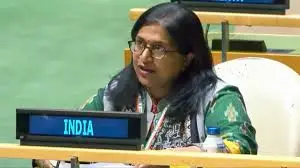‘Minister’s open confession exposes Pakistan as rogue state’: India at UN

India at UN: Pakistan Minister’s Confession Exposes Rogue State Behavior
United Nations, New York – April 29, 2025
India launched a strong diplomatic attack on Pakistan at the United Nations after a shocking confession by a former Pakistani minister. The minister admitted that Pakistan had supported terror groups for strategic gains. India cited this as clear proof that Pakistan uses terrorism as a tool of state policy.
Minister’s Confession Sparks Global Outrage
A former interior minister of Pakistan recently gave an explosive TV interview. He admitted that Pakistan backed armed groups operating across the Line of Control (LoC). He called these actions necessary for “strategic depth” and “national interest.”
India’s Permanent Representative to the UN, Ruchira Kamboj, responded swiftly. She called the admission “a public confirmation” of Pakistan’s long-standing terror support. “This isn’t a slip. It’s a deliberate statement that proves Pakistan’s role in sponsoring terrorism,” she said.
India Labels Pakistan a Rogue State
Kamboj didn’t mince words. She said Pakistan continues to harbor terrorists while pretending to seek peace. “They protect UN-designated terrorists and then talk about dialogue. The global community must take note,” she added.
India urged the UN to view the confession as undeniable evidence. Kamboj stated, “The minister’s words reflect the core of Pakistan’s foreign policy—terrorism as a weapon.”
Decades of Terror Backed by Policy
India reminded the UN of several terror attacks it attributes to Pakistan-based groups. These include the 2001 Parliament attack, the 2008 Mumbai attacks, and the 2019 Pulwama bombing. In each case, India said Pakistan either funded or shielded the attackers.
New Delhi argued that the confession fits a pattern. It shows how Pakistani leaders have used militant groups for decades. “This isn’t isolated. It’s part of a consistent policy,” said Kamboj.
Global Reaction Builds
Pakistan has yet to officially respond at the UN. However, the minister’s remarks are already causing international concern. A European diplomat, speaking off the record, said, “If not clarified, this could damage Pakistan’s credibility.”
Some analysts believe the statement could trigger renewed scrutiny by bodies like the Financial Action Task Force (FATF). The FATF has already placed Pakistan under monitoring for terror financing in the past.
India’s Diplomatic Strategy in Action
Experts see India’s latest move as strategic. By quoting Pakistan’s own leaders, India aims to show the world that its claims are not just allegations. “India now has verbal proof. This strengthens its case against Pakistan on global platforms,” said Dr. Anjali Mehta, an international relations expert.
India also called on countries to take real action, not just issue statements. “Terrorism grows when ignored. It destabilizes entire regions. The time for silence is over,” said Kamboj.
Pakistan Faces Backlash at Home
The confession has sparked a storm in Pakistan. Politicians are divided. Some accused the former minister of damaging the nation’s image. Others argued he simply revealed the truth to push for change.
Pakistan’s media has also reacted strongly. Some outlets condemned the statement. Others warned that denying it would only make things worse.
India Calls for Global Accountability
India ended its UN address with a direct appeal. “Stop treating Pakistan as a victim. It is a sponsor of terrorism. The global community must hold it accountable,” said Kamboj.
India’s message was clear: the world must respond, not with words, but with action. “Terrorists can’t act without shelter. And this shelter is being provided by a state,” she added.
What’s Next?
India plans to raise the issue in future UN sessions. It may also urge the FATF and other global bodies to increase pressure on Pakistan. If the international community reacts strongly, Pakistan may face more isolation.
The coming weeks will show whether the world treats the minister’s confession as a turning point. But for now, India has made it clear—it will not let the issue fade.






